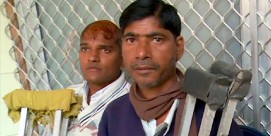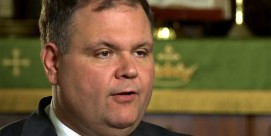In This Episode << SLIDE LEFT TO SEE ADDITIONAL SEGMENTS
Responsible Medicaid Patients
BOB ABERNETHY, anchor: Across the country, every state has a Medicaid program that provides health care for the poor. In West Virginia, there’s a lively debate about a new experiment with its program: giving patients extra medical and pharmacy benefits if they sign a contract to take better care of themselves. Is that fair? Does it leave out many of those who need care the most? Betty Rollin has our report.
BETTY ROLLIN: It’s a big night game in Charleston, West Virginia and, of course, food is part of the fun. But food is also one of the reasons that the state of health in West Virginia is so alarming.
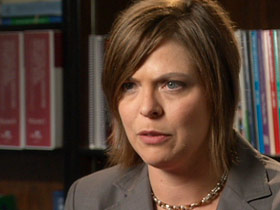
SHANNON RILEY (West Virginia Department of Health and Human Resources): In West Virginia we have one of the unhealthiest populations in the nation. We have the highest incidences of disability, we have very high rates of obesity and obesity-related diseases — hypertension …
ROLLIN: In addition, West Virginia ranks among the highest in cases of diabetes. More than one-fourth of adults smoke and about one-fourth of adults do not exercise, and because the state is mostly rural and transportation is often unavailable, many patients seek medical treatment only for emergencies.
West Virginia recently began a controversial new program which is being offered to the 22 percent of the population on Medicaid. This clinic in Clay, West Virginia, is one of three which now provides enhanced Medicaid benefits to those who sign a personal responsibility contract. Critics find the plan punitive. Everyone should get the benefits, they say. They question the fairness of placing responsibility on patients who are least able to comply.
One of the requirements is to show up promptly for medical appointments, which many Medicaid patients fail to do because they lack transportation. Another requirement is to at least try to lose weight.
(Smoking Cessation Hotline): This is Jonna. How may I help you?
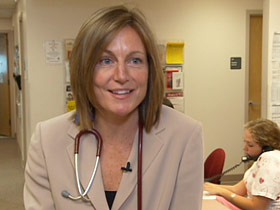
ROLLIN: Those who sign up also pledge to stop smoking, and there’s help with that, too. And participants get full prescription coverage. That has meant a lot to 45-year-old Bonnie Duffield, who suffers from heart disease, diabetes, and hypertension and takes nine medications daily. The extra benefits stop if the patient fails to keep up with the requirements of the contract.
Dr. SARAH CHOUINARD (Medical Director, Clay Clinic, West Virginia, to Ms. Duffield): Tell me what brings you in today? Are you needing medications, or have you been sick? How have things been going?
BONNIE DUFFIELD (Patient): Well, ups and downs, but I need medication prescriptions.
Dr. CHOUINARD (to Ms. Duffield): Okay, are you just out or are you just low on things?
Ms. DUFFIELD: I’m just out.
Dr. CHOUINARD (to Ms. Duffield): Really. Completely out. Yikes!
ROLLIN (to Ms. Duffield): Has signing this paper made you eat in a healthier way?
Ms. DUFFIELD: Yeah, because it’s made me pay more attention to what I’m eating and see where — what foods are putting my sugar way up. My daughter’s overweight and, you know, I’ve been trying to encourage her to lose weight.
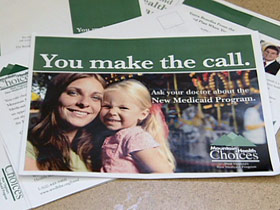
ROLLIN (to Ms. Duffield): So this has benefited her as well as yourself?
Ms. DUFFIELD: And I’m encouraging good snacks for my granddaughter.
ROLLIN: Dr. Sarah Chouinard admits that getting patients to change their eating habits is extremely difficult.
Dr. CHOUINARD: And if you look at the menu at some of the restaurants here, you know, biscuits and gravy and chicken fried steak and those types of things are popular menu items, and there’s not been anybody to challenge that regularly or routinely.
ROLLIN: What critics see as placing unreasonable demands on patients Dr. Chouinard sees as empowerment.
Dr. CHOUINARD: So we used to take a real, you know, paternalistic role, and that was kind of what we were taught to do, and now we are saying, “Hey, we’ve had years and years of education, and we’re going to help you in any way that we can, but there’s plenty that you can do on your own in a good way.”
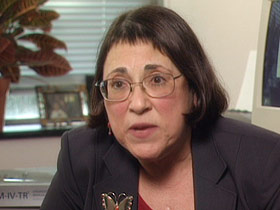
ROLLIN: Dr. Amy Brodkey worries that the program harms the doctor-patient relationship.
Dr. AMY BRODKEY (Psychiatric Medical Director, Philadelphia): Everyone is in favor of people taking responsibility for their health. But what we know is that those behavioral changes take place within the context of a personalized, trusting doctor-patient relationship, not something that is contracted to the state.
ROLLIN: Dr. Brodkey thinks the contract is especially unfair to children.
Dr. BRODKEY: Children don’t sign the contract, the parents sign the contract. And the child can’t control what the parent does in terms of keeping appointments, taking medication and so forth.
Ms. RILEY: To say that children will suffer because their parents won’t do the right thing as a criticism of Medicaid, I think, is a bit disingenuous. A parent who won’t sign their child up for the enhanced plan, that child is still receiving very good health insurance, and Medicaid as a health insurer can’t police parental behavior. It’s beyond the scope of our mission.
ROLLIN: The patient responsibility contract has begun to expand statewide. If it is successful, other states are likely to follow.
Ms. RILEY: This is not about short-term cost containment. This is an investment in the health of our population. Will that save money in the long term? Yes, we believe it will, by controlling the growth of the program.
ROLLIN: Since the program is too new to have been studied, there are still two unknowns — whether a majority of patients will take better care of themselves and whether long-term costs, $2.7 billion a year in West Virginia alone, will decrease.
For RELIGION & ETHICS NEWSWEEKLY, I’m Betty Rollin in Charleston, West Virginia.

